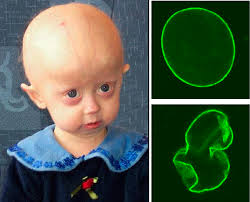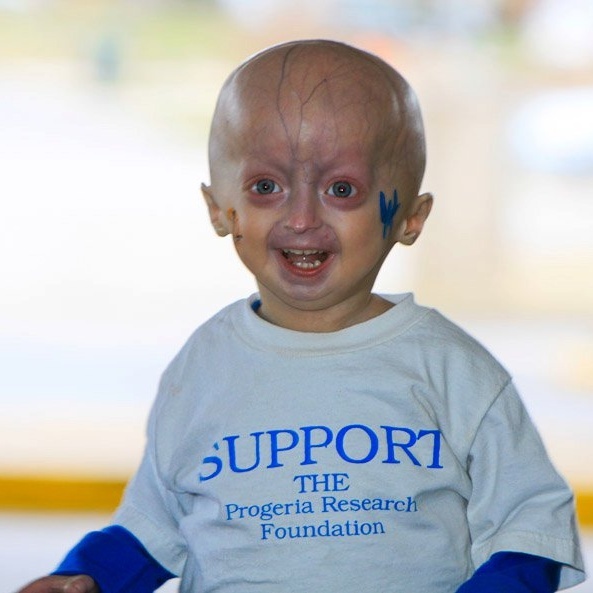What is Progeria?

Progeria has many different names.One of the name given to this disease is called Hutchinson-Gilford Progeria Syndrome(HGPS). HGPS is caused by a mutation in the gene called LMNA. The LMNA gene produces the Lamin A protein, which is the structural scaffolding that holds the nucleus of a cell together. Researchers now believe that the defective Lamin A protein makes the nucleus unstable. That cellular instability appears to lead to the process of premature aging in Progeria.Although they are born looking healthy, children with Progeria begin to display many characteristics of accelerated aging at around 18-24 months of age. Progeria signs include growth failure, loss of body fat and hair, aged-looking skin, stiffness of joints, hip dislocation, generalized atherosclerosis, cardiovascular (heart) disease and stroke. The children have a remarkably similar appearance, despite differing ethnic backgrounds. Children with Progeria die of atherosclerosis (heart disease) at an average age of fourteen years.

Signs,Symptoms/Effects on body:
Slowed growth, Narrowed face, small lower jaw, thin lips and beaked nose, Head disproportionately large for face, Prominent eyes and incomplete closure of the eyelids, Hair loss, High-pitched voice, Loss of muscle mass, Fragile bones, Stiff joints, Hip dislocation, Severe progressive heart and blood vessel (cardiovascular) diseaseSkeletal system:Stiff joints,Hip dislocations Muscular System:Loss of body fat and muscle Cardiovascular system:Myocardial infarction
Treatments:
Medications: A child's doctor may prescribe drugs to lower cholesterol or prevent blood clots. A low dose of aspirin every day can help prevent heart attacks and stroke. Growth hormone can help build height and weight. Physical and occupational therapy can help the child keep moving if they have stiff joints or hip problems. Surgery: Some children may have coronary bypass surgery or angioplasty to slow the progression of heart disease. At home: Kids with progeria are more likely to get dehydrated, so they need to drink plenty of water, especially when they're sick or it's hot. Small meals more often can help them eat enough, too. Cushioned shoes or inserts can ease discomfort and encourage your child to play and stay active.Hayley Okines:
Hayley from England, a teenager with Progeria who has captured the hearts of many around the world. Hayley has won the prestigious Children of Courage Award and appeared in several documentaries and stories about Progeria. Read about her adventures on her website and in her book, Old Before My Time, written with her mom Kerry about living with Progeria
By: Jillian Fleming & Taylor Collins